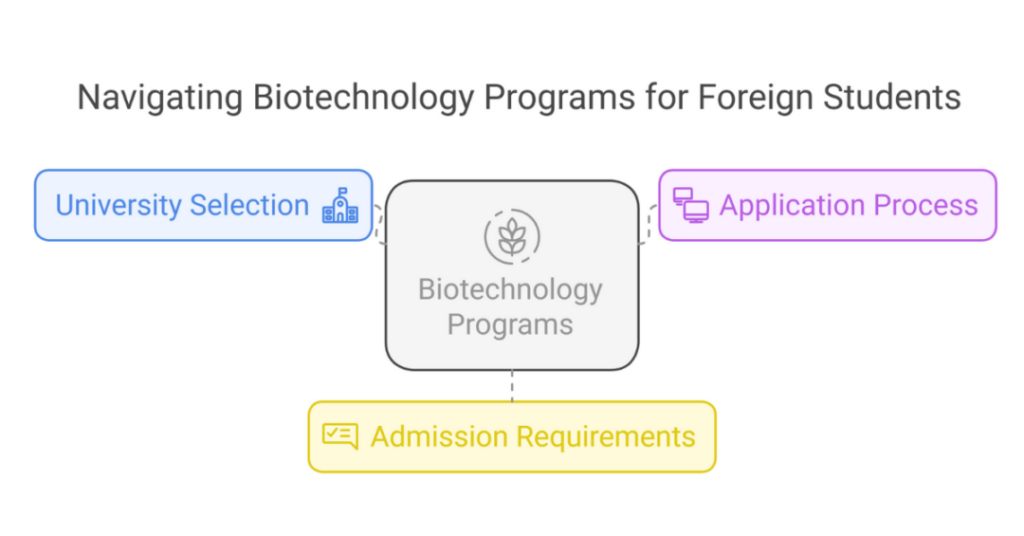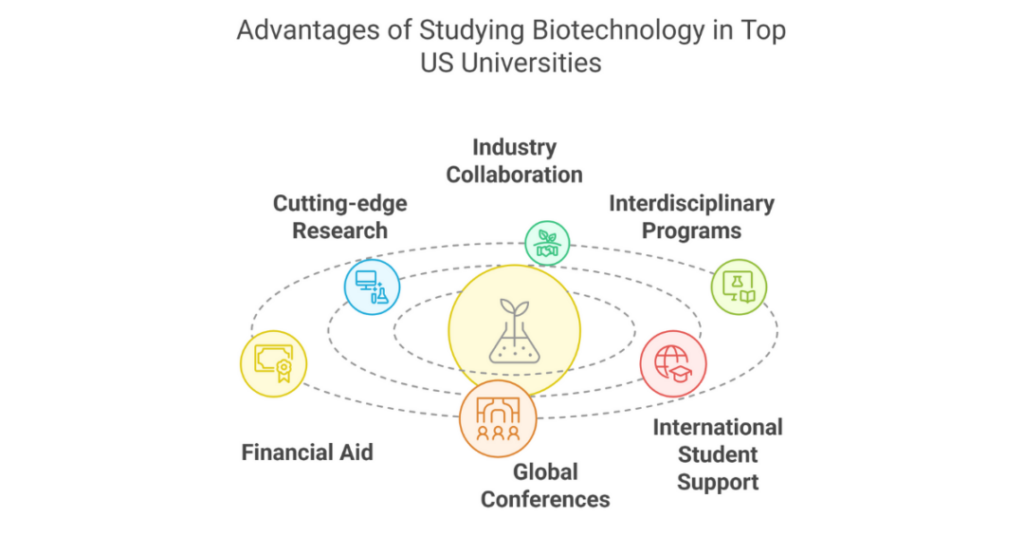15 May 2025
6 minutes read
Top Universities in USA for PhD in Biotechnology for Indian Students

Key Takeaways
- Top universities in USA for PhD in biotechnology provide cutting-edge research in bioengineering, informatics, and biomedical sciences for global scholars.
- Top universities in USA for PhD in biotechnology offer strong industry ties, scholarships, and access to leading biotech companies and innovation hubs.
- Top universities in USA for PhD in biotechnology include MIT, Stanford, and Harvard, known for their interdisciplinary programs and expert faculty.
Biotechnology in the USA is a phenomenon that is revolutionizing life-changing innovations. For Indian students who aim to make their mark in this field, top universities in the USA for PhD in Biotechnology offer not just education but a platform to conduct path-breaking research. From synthetic biology to biodefense, these degrees offer intensive learning with rigorous curriculums and state-of-the-art facilities.
With institutions like Stanford University and the University of California at the helm, students are embraced by labs that make the future. Choosing to do a PhD in biotechnology in the US opens doors to an international network, career-defining internships, and exposure to biotech companies that are shaping the future of biomedical engineering and biological sciences.
Why Study Biotechnology in Top Universities in USA?
Did you know that the US biotechnology industry is employing over 1.66 million professionals? It comes as no surprise then that the country also has many universities in the USA where some of the most sophisticated biotechnology courses in the world are being taught.

Going to top universities subjects you to a network and infrastructure well beyond the lecture hall. Here are some of the reasons why students pursuing PhD degrees in this field prefer such universities:
- Access to cutting-edge research possibilities in biotechnology and synthetic biology
- Collaboration with biotech companies and biomedical sciences research institutions
- Interdisciplinary programs that combine bioengineering, cell biology, and informatics
- Scholarship, fellowship, and assistantship financial aid opportunities
- Access to global conferences and innovation hubs via university invitations
Comparison: Top US vs Other Global Universities:
| Feature | US Universities | Global Counterparts (UK, Canada) |
|---|---|---|
| Industry Collaboration | Strong biotech company ties | Varies; strong in select programs |
| Research Funding | High NIH and private funding | Comparatively moderate |
| Curriculum | Interdisciplinary and updated | More traditional in approach |
| Opportunities for Internships | Abundant with biotech giants | Moderate |
| International Student Support | Extensive resources and visa help | Varies across universities |
5 Best Universities for PhD in Biotechnology in the US
Fun fact: MIT engineers once developed living tattoos using engineered bacteria. That gives you some idea of the innovative potential in US biotechnology universities.
If you want to earn a PhD in biotechnology and be among this new generation of scientists, these five US universities are strong contenders.
1. Stanford University
Stanford brings biology and technology together, developing innovative research in synthetic biology and biomedical engineering. Its bioengineering department has intimate connections with Silicon Valley industries, ensuring practical implementations.
The PhD program integrates molecular biotechnology, informatics, and cell biology with experimental research in the laboratory. Students have generous financial aid, access to biotech companies, and an active research environment.
Stanford PhD Requirements
| Requirement | Details |
| GRE | Optional but recommended |
| TOEFL/IELTS | TOEFL 100 / IELTS 7.0 |
| GPA | Minimum 3.5 |
| Letters of Recommendation | 3 required |
| Research Exp. | Strongly preferred |
2. University of California
The University of California network, especially UC San Diego and UC Berkeley, is a leader in biotechnology research. It is famous for its biosystems innovation and biotechnology programs and has a graduate program with a focus on synthetic biology and bioengineering.

Students work on interdisciplinary research in collaboration with Nobel laureates. Most universities under UC have both undergraduate and graduate courses so that transitions can be made easily.
University of California PhD Requirements
| Requirement | Details |
| GRE | Not mandatory |
| TOEFL/IELTS | TOEFL 90 / IELTS 6.5 |
| GPA | 3.0 or higher |
| Letters of Rec. | 3 required |
| Research Exp. | Essential for consideration |
3. Harvard University
As one of the Ivy League schools, Harvard University blends foundational biochemistry with modern bioinformatics.
The school of medicine, department of stem cell and regenerative biology, and faculty of arts and sciences contribute to a robust biotechnology graduate program. Students enjoy mentorship from top biotechnology experts and access to Harvard-affiliated hospitals.
Harvard PhD Requirements
| Requirement | Details |
| GRE | Not required |
| TOEFL/IELTS | TOEFL 100 / IELTS 7.5 |
| GPA | 3.7 or higher |
| Letters of Rec. | 3 academic references |
| Research Exp. | Mandatory |
4. Massachusetts Institute of Technology
MIT defines innovation in biotechnology in the USA. Home to one of the best biotechnology research centers, its Ph.D. program features studies in biodefense, biological engineering, and biomedical sciences.
With a hands-on focus, the university offers unmatched access to biotech labs, grant funding, and interdisciplinary mentorship.
MIT PhD Requirements
| Requirement | Details |
| GRE | Optional |
| TOEFL/IELTS | TOEFL 100 / IELTS 7.5 |
| GPA | Minimum 3.5 |
| Letters of Rec. | 3 strong letters |
| Research Exp. | Extensive experience required |
5. Johns Hopkins University
Johns Hopkins University excels in translational research and biotechnology applications. Its biotechnology graduate program spans biological sciences, regulatory affairs, and biomedical.
Students gain hands-on training in laboratories connected with the university’s medical school and affiliated biotech firms. The PhD program also supports work in informatics and systems biology.
Johns Hopkins University PhD Requirements
| Requirement | Details |
| GRE | Not required |
| TOEFL/IELTS | TOEFL 100 / IELTS 7.0 |
| GPA | 3.3 or higher |
| Letters of Rec. | 3 academic/industry references |
| Research Exp. | Preferred but not mandatory |
Application Process and Admission Process for International Students
Fun fact: Nearly 30% of all graduate students in biotechnology programs in the US are foreign students. That number is still rising.
Applying as a foreign student might feel like navigating a maze, but it becomes manageable with a step-by-step approach. Below are key things every student should know when looking for the best universities across the USA, UK, and Canada:
- Identify your preferred field: biotechnology, bioinformatics, synthetic biology, etc.
- Shortlist universities for biotechnology such as Stanford, University of Toronto (Canada), Harvard, and University of Cambridge (UK)
- Check if the university offers a dedicated biotechnology program or department
- Prepare for standardized tests: GRE, IELTS, TOEFL, GMAT, SAT, ACT (depending on program)
- Write a compelling Statement of Purpose (SOP)
- Gather strong Letters of Recommendation
- Prepare a detailed CV/Resume with research experience
- Explore tuition fees and financial aid including scholarships and assistantships
- Submit applications via the official portal or platforms like CommonApp (for some programs)
- Track deadlines and follow up on interview requests if applicable
Admission Requirements Snapshot:
| University | IELTS | TOEFL | GRE | Additional Notes |
| University of Pennsylvania (US) | 7.0 | 100 | Optional | Ivy League; strong in biomedical research |
| University of Toronto (Canada) | 6.5 | 93 | Required | Top biotech research hub in Canada |
| University of Cambridge (UK) | 7.5 | 110 | Required | Renowned for synthetic biology |
| University of California (US) | 6.5 | 90 | Not Required | Leading biotech campuses |
| Johns Hopkins University (US) | 7.0 | 100 | Not Required | Known for biotech and informatics |
| Harvard University (US) | 7.5 | 100 | Not Required | Strongest Ivy League biotechnology |
| University of British Columbia | 6.5 | 90 | Optional | Known for molecular biotechnology |
| Massachusetts Institute of Technology | 7.5 | 100 | Optional | Strong in biodefense and biosystems |
What are the Scholarship Options Available?
Fun fact: Over 50% of international PhD students in the US receive some form of scholarship or financial aid.
Funding your biotechnology degree doesn’t have to be overwhelming. Here’s how to find the best financial options:
- University-specific fellowships (e.g., Stanford BioX Fellowship)
- Government-sponsored scholarships (e.g., Fulbright-Nehru, Vanier Canada Graduate Scholarships)
- Research Assistantships and Teaching Assistantships
- Biotechnology industry-sponsored grants
- Scholarships for Indian students by private foundations
Scholarship Comparison Table
| Scholarship | Covers | Eligible Countries |
| Fulbright-Nehru Fellowship | Tuition fees + stipend | India -> USA |
| Vanier Canada Graduate Scholarships | Tuition + living expenses | All (Canada focus) |
| Stanford BioX Fellowship | Full funding for research | All |
| Harvard GSAS Fellowship | Tuition + living stipend | All |
| MIT Dean’s Fellowship | Partial/full tuition | All |
Job Scope After a PhD Degree in Biotechnology in USA
Fun fact: The US biotechnology industry adds over $150 billion annually to the economy.
A PhD in biotechnology in the USA unlocks prestigious and high-paying roles. Here’s what you can explore after graduation:
- R&D roles in top biotech companies like Genentech, Amgen, Pfizer
- Academic positions at universities and colleges
- Regulatory affairs and policy consulting
- Biomedical engineering or biomedical sciences R&D
- Entrepreneurial ventures in synthetic biology or biodefense
Career Comparison Table:
| Role | Avg Salary (USD) | Top Employers/Institutes |
| Research Scientist | 95,000 | NIH, Genentech, Biogen |
| Biomedical Engineer | 88,000 | Medtronic, Boston Scientific |
| Regulatory Affairs Manager | 105,000 | FDA, Pfizer, Johnson & Johnson |
| Assistant Professor | 80,000 | Ivy League schools, MIT |
| Biotech Entrepreneur | Varies | Startup incubators, VC firms |
Conclusion
Choosing a PhD in biotechnology from the USA is not only an intellectual decision—it’s a leap into innovation. The top universities in the world, including Harvard, Massachusetts Institute of Technology, and Stanford, offer unparalleled graduate program experiences.
Students are adequately prepared in bioengineering, synthetic biology, and biomedical sciences. From application to post-doctoral research, international students are supported, funded, and career-proofed in biotechnology in the USA.
Whether it is the cutting-edge research or the scholarship-supported financial aid, the US remains the destination of choice for those prepared to improve the quality of human existence through biotechnology.
Ambitio has your back! Get in touch our experts and make your dreams come true.
FAQs
What are the top universities in USA for PhD in biotechnology?
The top universities in USA for PhD in biotechnology include renowned institutions like Stanford, MIT, and Harvard. These top universities in USA for PhD in biotechnology are known for academic excellence and cutting-edge research.
Why choose the top universities in USA for PhD in biotechnology as an international student?
The top universities in USA for PhD in biotechnology offer international students world-class research, funding options, and access to the thriving US biotech industry.
Do top universities in USA for PhD in biotechnology require the GRE?
Most top universities in USA for PhD in biotechnology have made the GRE optional, though a strong score may still strengthen your application.
What kind of research is available at top universities in USA for PhD in biotechnology?
Top universities in USA for PhD in biotechnology provide research opportunities in synthetic biology, biomedical engineering, bioinformatics, and more.
Are scholarships available at top universities in USA for PhD in biotechnology?
Yes, scholarships and assistantships are widely available at top universities in USA for PhD in biotechnology, helping international students fund their studies.
How competitive is admission to top universities in USA for PhD in biotechnology?
Admission to top universities in USA for PhD in biotechnology is highly competitive and typically requires strong academic records and research experience.
What career options follow graduation from top universities in USA for PhD in biotechnology?
Graduates from top universities in USA for PhD in biotechnology pursue roles in research, biotech companies, academia, regulatory affairs, and entrepreneurship.

You can study at top universities worldwide!
Get expert tips and tricks to get into top universities with a free expert session.
Book Your Free 30-Minute Session Now! Book a call now




























